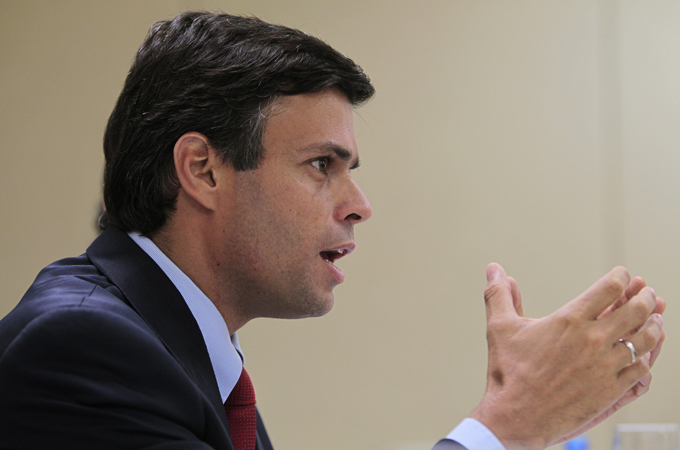Venezuela court bars Chavez rival from office
Supreme Court blocks prominent opposition leader from holding public office ahead of elections, angering rights groups.

 |
| Leopoldo Lopez was on a list of politicians blacklisted due to corruption investigations [Reuters] |
Venezuela’s Supreme Court has decided to block a prominent opposition leader from holding public office, rejecting an international court ruling that called the government’s disqualification unjustified.
Monday’s decision to uphold a bar on Leopoldo Lopez narrows the field of contenders to take on Hugo Chavez, the country’s president, in the October 2012 presidential elections.
Lopez was one of three leading opposition candidates vying to win the opposition coalition’s presidential primary in February.
The court, however, chose to ignore a ruling by the Costa Rica-based Inter-American Court of Human Rights last month that said Lopez’s disqualification from politics over corruption allegations was unjustified.
“This Supreme Court … declares that the Inter-American Court of Human Rights decision against the Venezuelan state cannot be executed,” the court said in a statement, specifying that Lopez could run in elections but not take up any office.
Lopez challenged his disqualification in the regional human rights court arguing that his political rights were violated, and that court ruled in his favour on September 1.
His campaign team said in a statement that he would publicly respond to the Supreme Court decision on Tuesday.
The team also said the decision “damages international agreements signed and ratified” by Venezuela.
Human rights activists had joined Lopez in urging Venezuela to respect the ruling by the rights court.
Corruption investigation
The 40-year-old former Caracas district mayor was on a list of politicians blacklisted due to corruption investigations, allegations he denies.
Accused of, but not tried for, corruption, Lopez was barred from seeking public office until 2014.
The temporary prohibition resulted from multiple allegations. One accusation involved a donation made in 1998 by PDVSA, a state oil company, of which he was a member.
The donation was controversial because his mother, a PDVSA employee at the time, had signed the cheque.
Authorities also accused Lopez of illegal diversion of Chacao district funds under his control.
Chavez had criticised the Inter-American Court of Human Rights after its ruling, saying it was part of an international system that “protects the corrupt and obeys the mandate of the [US] imperial power”.’
Polls show Lopez is a strong contender for the presidential race though trailing others such as state governors Henrique Capriles and Pablo Perez.
‘Deplorable decision’
Risa Grais-Targow and Daniel Kerner, political risk analysts at Eurasia Group, said: “The [court] ruling essentially kills Lopez’s presidential aspirations, and favours [Capriles], who enjoys a substantial lead in the polls.”
“In this sense, it doesn’t alter the political outlook substantially,” they said in a note to clients.
The Democratic Unity Table, a coalition of Venezuela’s main opposition parties, condemned the Supreme Court ruling, saying in a statement that it violated the constitution as well as international treaties.
“The Venezuelan state is obligated to accept the rulings of the Inter-American Human Rights Court,” the opposition coalition said.
“We see this deplorable decision as another reason to bring about a peaceful, democratic and constitutional change.”